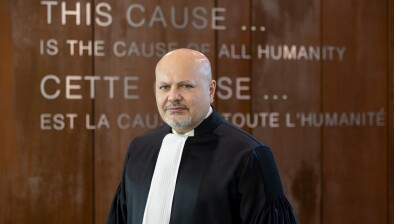New legal dictionary aims to ‘de-Russify’ Ukrainian constitutional law

Pictured (L-R): Professor Olena Boryslavska and Professor Lisa Webley
Credit: Nicola Gotts
A new English-Ukrainian legal dictionary has been created to remove historic Russian influence from the definition of constitutional legal terminology.
The dictionary contains definitions for over 1,000 legal terms and has been created by legal experts from Ukraine’s Constitutional Court, the Department of Constitutional Law at Ivan Franko National University Lviv, and the University of Birmingham Law School.
The dictionary has been created to remove any historical Russian influence from Ukraine’s law and make it more constitutionally robust in light of Russia’s ongoing invasion of Ukraine and the resulting war.
Through historical and legal analysis, the dictionary seeks to rectify the acute problems that the continued application of post-Soviet legal terminology causes for understanding the rule of law in Ukrainian jurisprudence, further embed the rule of law in Ukraine, and support Ukraine’s development as a constitutional democracy and advance Euro-Atlantic integration.
Professor Olena Boryslavska, head of the Department of Constitutional Law at Ivan Franko National University of Lviv said: “The correct translation of legal terms may be a small but essential step towards restoring the true meaning of concepts crucial to the rule of law and human rights. That became the core idea of the English-Ukrainian Legal Dictionary project.”
The dictionary includes definitions for terms, which previously had Russian influences in their definitions. For example: the rule of law; parliamentary control; false imprisonment; executive privilege and dissent.
Technical linguists in Ukraine translated and defined each term with input from Ukrainian legal scholars who identified key legal sources to provide illustrative examples of the correct use of the term in practice.
Then, over a period of nine months, 35 students from Birmingham Law School ensured that open-access cases and other legal materials were included in a way that outlined the usage of the concepts in English law to strengthen understanding of the meanings of the terms.
Professor Lisa Webley, chair in legal education and research at Birmingham Law School, said: “This has been a wonderful opportunity for Birmingham Law School students to be involved in shaping the material that Ukrainian lawyers refer to when considering fundamental legal concepts.
“It has brought home to us all what a vital role our understanding of key legal terms plays in a well-functioning legal system. It has allowed us to reflect on our own system at the same time as supporting our colleagues in Ukraine with theirs.”
The completed dictionary will be made available to legal professionals and scholars in Ukraine so the updated definitions can be used in practice.









